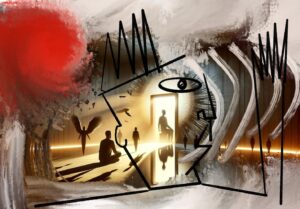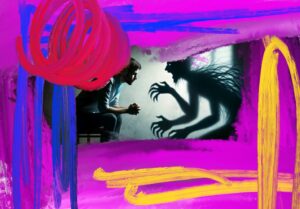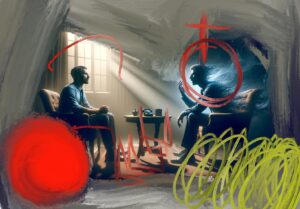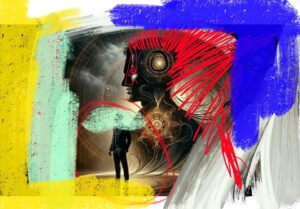Bernie’s Chapter

(No not sanders)
Introduction to Shadow Work
Have you named your shadow yet?
Have you become friends?
Or done the spooky sounding Jungian shadow work?
That part of our unconscious that keeps sabotaging us:
That puts a beer in your hand or a rolled bill in your nose,
That tells you you’ve already blown it,
That tells you, even when you’re on the right track, that it’s too late and you should have done it years ago.
The very voice of toxic shame,
And self-condemnation:
The shadow,
The darkness.
Here’s an idea…
Give him a name and have a conversation with him.
I call mine Bernie,
Or Burn Y.
Why burn?
Rhymes with Lyburn, my middle name.
Bernie.
When you name the shadow and talk to him,
When he puts you down,
He’s kinda shocked you notice,
You’ve gone so long not noticing him at all (consciously)
So many years spent running from his voice and the feelings that arise from it.
It’s mad at first to realize you can just name him and have a little chat.
Something strange happens as well:
You realize that Bernie isn’t all bad.
He’s just deeply afraid and turned mad from neglect.
He’s been hidden and ignored so much
That he’s grown into a monster.
But with the light of awareness, he becomes infinitely smaller,

As to almost disappear.
After all, he was only there to protect you,
As he was born of the sides of yourself you deemed unworthy and unwelcome,
Sides that were problematic in your childhood,
Which your parents perhaps couldn’t contend with.
“Hi Bernie,
“I’m sorry I ran from you for so long.
I know you’re probably angry for being ignored.
And the abusive things you hurl from the darkness are only so severe as to get my attention.
It’s fair enough, really.
But your defense mechanisms and your fears are outsized for the reality that we want to create here, so let me tell you straight , I see you.
Facing you now,
I want to say that I wish we could be friends.
I’m tired of running.”
That’s shadow work. Making friends with Bernie.
Embracing and Understanding Bernie
(Or whatever goofy name you give your shadow)
It sounds kinda funny,
Naming our shadow or an aspect of ourselves we’ve neglected and hidden which has become corrupt as a result.
But it’s a fun and effective way
To do so-called shadow work,
And it is an excellent way to make the unconscious conscious.
When I find myself in fear or telling myself something damning and condemning,
I say, “What’s up, Bernie?
I don’t think you really mean that.
We’re okay.
We’re building from this day forward here together.”
And just as awareness or witness consciousness
Brings the ego and the imagination into its proper place,
So it does with the shadow.
The work is to be aware of the internal landscape,
Over and over again,
To practice awareness constantly,
To pray ceaselessly,
To make friends with the shadow,
To have a cup of coffee with Bernie,
And discuss the state of the union.
Unification of self.
The Philosophical and Psychological Depths
Make friends with the shadow,
Give him a name,
Ask him what’s up
With that toxic shame.
Question his voice,
From whence it came.
Make friends with the shadow,
Give him a name.

2
The Disowned Self
The shadow is referred to often as the disowned self.
“A man who is unconscious of himself acts in a blind, instinctive way and is in addition fooled by all the illusions that arise when he sees everything that he is not conscious of in himself coming to meet him from outside as projections upon his neighbor.” – Carl Jung.
So why have we cut ourselves off?
Why have we disowned aspects of ourselves,
Only to be haunted by them and their terrorizing voices which thwart our dreams,
And become externalized in what we think are annoying qualities in others,
Keeping us unconscious and in many ways neutered?
(Integration and Self-Realization)
Well, I’m no expert, but loosely it’s because when we were kids, we were all overwhelming forces of nature and chaotic, and our parents were trying to get by,
Deal with each other,
Deal with life,
Deal with themselves,
And had to keep us contained and in line.
So they would have told us stuff like,
“Don’t be angry,
Don’t be sad,
Don’t be this and don’t be that.”
Even if they were loving and doing the best they could,
They would have reflected back to you, probably in less than a perfect psychologically healthy way, that something you were doing needed to change.
It’s only natural.
And obviously, some parents did that in very harsh or even abusive ways.
But even if they didn’t,
A shadow would develop,
Aspects of yourself you would have cut off,
And made unconscious for the sake of survival
(Or your perception of what is needed to survive).
The problem is those aspects don’t just lay dormant.
They start getting freakier and freakier, trying to get your attention so that they can come back home into the fullness of your being.
Jung said integration of your shadow was a moral equation.
I suppose there is a place of seeking an honest reflection that must be arrived at before we are even open to integrating this “dark side” of ourselves.
“The shadow is a moral problem that challenges the whole ego-personality, for no one can become conscious of the shadow without considerable moral effort. To become conscious of it involves recognizing the dark aspects of the personality as present and real.” – Carl Jung.
Why moral effort?
Moral means concerned with what’s right.
A whole other discussion could be had about where these moral urges come from, but for now, I find this aspect perhaps most interesting in terms of Jung’s theories about shadow work.
Because when you consider that this work must take considerable moral effort, the idea of moral effort brings a spiritual component into the equation. And one could argue, even the voice of God (depending on where you think morals come from).
And if we think about it, what else but a moral urging, or a godly urging, would push us to integrate fallen aspects or hidden aspects of who we are?
We are vast; we contain multitudes.
“Do I contradict myself? Very well then I contradict myself, (I am large, I contain multitudes.) I concentrate toward them that are nigh, I wait on the door-slab.” – Walt Whitman.
Interesting, this quote came from Walt’s acknowledgment that he contradicted himself.
(Showing a split/ a shadow)

We want to be good,
And we should be good,
Or try to be good.
But at the same time,
If underneath us are seething emotions of rage,
And yet we smile,
We become much worse than one displaying the rage that is actually there,
Because we then are wearing the disguise of a liar.
So, shadow work becomes moral as a pathway to greater honesty,
And not as a way to justify rage or allow it to linger.
But rather, we should deal with it,
Face it,
Express it in a healthy way,
Forgive and move on.
None of this can happen, though, if it remains unconscious.
And that unconscious force gives room and amplifies the voices of darkness and self-condemnation from within.
Think of the shadow like the depth of our being.
And this makes it more appealing.
We want depth.
We don’t want to be fake.
Or superficially nice.
We want to resonate,
As trustworthy and honest with strong integrity and morally centered.
Facing our shadow allows us to vibrate on those frequencies,
In the wholeness of who we are.

- Lou Reed and creative Sass…
Creative Sass and How the Shadow Helps Us Dance in the Light After All
“In spite of its function as a reservoir for human darkness—or perhaps because of this—the shadow is the seat of creativity;” – Carolyn Kaufman.
My friend Lance uses the term “Sass”
When describing a certain punk rock spirit in highly creative music.
Sass means to be cheeky or rude.
Lou Reed embodies Sass as a musician, singer, and songwriter like nobody’s business.
It’s the quality of provocation,
The punk rock spirit,
The “I don’t give a (bleep) what you think,”
That encompasses so much of the music we’ve come to love most.
Why do we like that music?
Why do we like music that pushes aggressively at times,
That is noisy and seems not to care at all what we think?
Shadow work and creativity emerging from it,
The authentic kind,
The kind that resonates with authenticity,
Is a big hint
At where the moral calling lines up with shadow work,
And why we have an innate respect for artists that have that sassy quality.
In art and music, we can see perhaps more clearly when someone is being true to themselves,
Or grooving to the beat of their own drum.
We love it when artists display this type of authentic irreverence and integrity,
Or when they seem to be in no way concerned with people-pleasing.
The realm of art is like a magnifying glass to the qualities we possess as people, and we all aspire to be free enough to display the full integration of who we are.
So therefore, artists like Lou Reed become symbolic, in a way, of that type of freedom or integration of the shadow.
Or to put it even simpler,
They are as sassy as they wanna be,
And as sassy as we all wanna be.
So when we integrate our shadow, naturally we become more creative,
Less concerned,
More likely to take creative risks,
And also operating from the fullness of who we actually are rather than who we are merely pretending to be.
We trust artists who operate this way because we innately understand that integration of our dark side has strong moral implications.
One who is integrated resonates as one who has significant character, for reasons we all intuitively understand.
None of us are essentially different in this realm.
Obviously, we all have different levels and different degrees of being fragmented,
And shadows don’t all contain the same matter.
But all of us have submerged aspects of ourselves through growing up,
All of us wandered into booby traps as fragmented beings,
Led by the repressed or shadow sides of ourselves,
Who were most likely just attempting to be noticed,
To push you against a wall,
Not to kill you,
But to wake you up.

“

